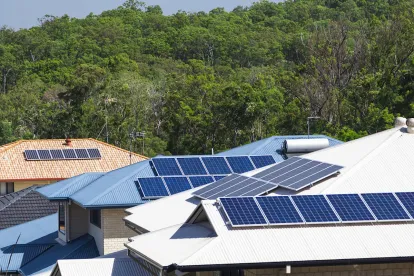Whether a solar system is a “fixture” sounds like a mundane legal issue – but it has significant implications for the residential solar industry and for the financing of residential solar systems. If a system is regarded as a “fixture” of the house to which it is attached, then the enforceability and priority of the finance company’s lien on the system will be subject to applicable real estate law. If, however, the system is not a “fixture,” then the system would be viewed as a “consumer good” with the finance company’s rights in the system governed by the Uniform Commercial Code (UCC) – which provides for a much more straightforward process for finance companies to preserve and protect liens on their financed systems. The risk to a finance company is particularly acute if a solar system is deemed a “fixture” of the house on which it is installed, as that could render the finance company’s lien on the system either unenforceable or subordinate to any mortgages on the house itself.
Despite the significance of this issue, few courts have considered the issue of whether residential solar systems should be viewed as fixtures or consumer goods. Recently, however, in the In re Evans case, the United States Bankruptcy Court for the District of New Mexico addressed the issue, first determining whether the home of the couple in bankruptcy was encumbered by a purchase money security interest in the solar system installed on the roof of the couple’s house before it could consider the otherwise unrelated issue of a judgment lien asserted by another creditor against the house. In a potentially significant ruling for solar power finance companies, the bankruptcy court held that “solar panels are not fixtures” and that the residential solar system retained its character as a consumer good even after installation (see In re Evans, No. 23-10622 T13, 2023 WL 8606655, at *1 (Bankr. D.N.M. Dec. 12, 2023)).
In determining that the solar system was not a fixture, the Evans court considered the three-factor test developed at common law and now embodied in Article 9 of the UCC for determining whether an item was a “fixture” of the underlying real estate: (1) annexation, i.e., were the goods permanently affixed to the house so that they had become part of it; (2) adaptation, i.e., were the goods adapted to the purpose of the portion of the real estate to which it is attached; and (3) intention, i.e., did the parties intend for the goods to become a permanent part of the underlying real estate. The Evans court analyzed those three factors as follows:
- Annexation – The court found that the solar system was “not permanently attached to the House. It could easily be removed without damaging the roof or other parts of the House. It is bolted on and could be unbolted. No annexation has taken place.”
- Adaptation – The court also noted that the solar system was not adapted or applied “to the use or purpose to which that part of the realty to which it is connected is appropriated.” In other words, the solar system was not adapted to be a roof or a part of the roof. Rather, the court highlighted that the “solar panels would function just as well if they were installed in a yard next to the house… Indeed, the roof would function better without the System.”
- Intention – The most important element in the court’s decision centered around the intent of the parties. The court determined that the intent of the parties was made unequivocally clear by the terms of the loan agreement the purchaser had signed with the company that financed the solar system purchase, which stated that “The [System] is not difficult to remove from the Residence and … it is not intended to be a fixture or to become a permanent part of the Residence. You agree that you will not make the [System] (or allow any Entity Owner to make the [System]) a permanent part of the [House] unless and until you first pay all amounts outstanding under this Note. Accordingly, you agree that our security interest is a security interest in personal property and not a security interest in real property or in the [House].”
Based on the language of the loan agreement and note, the court held that the parties clearly intended for the solar system not to be considered a fixture, rather than to be permanently attached to the house, stating that the system’s “situation is similar to a lender financing furniture or appliances—it has a security interest in the goods financed but not the house where the goods are kept.”
Although the court ultimately decided that the solar system was not a fixture, it noted that some of the language in the purchaser’s contract provided indications to the contrary. As an example, the court pointed to Exhibit D to the contract that provided that the customer was “buying the System,” while also stating “you are entering into an agreement to purchase power, not to purchase the system.” This same exhibit also provided the contradictory statement “this is not a PPA or lease.” Ultimately, the court decided to ignore Exhibit D, holding that it was superseded by the language in the loan agreement and promissory note that clearly indicated the parties’ intent. Nonetheless, the court advised the lender to delete Exhibit D and “make the rest of the documents easier to understand.”
The Evans decision is one of the first opinions regarding this crucial issue in the rapidly expanding residential solar industry. It provides a helpful overview of how parties can appropriately structure residential solar agreements to properly designate the solar system as personal property, not a fixture. It also provides a reminder that precise contractual language matters. Although the court ultimately found that the parties’ intent in Evans was to designate the solar system as personal property, the parties’ conflicting provisions in Exhibit D presented unnecessary risk to the lienholder. Evans offers a useful guideline for the proper structure of residential solar agreements. Developers and financiers in the residential solar industry would be wise to heed the lesson of this opinion: Clear and unambiguous contractual language designating a system as personal property (i.e., a consumer good), not a fixture, is likely to be persuasive in any later dispute regarding the appropriate status of security interests in a residential solar system.
Listen to this post here.







 />i
/>i
